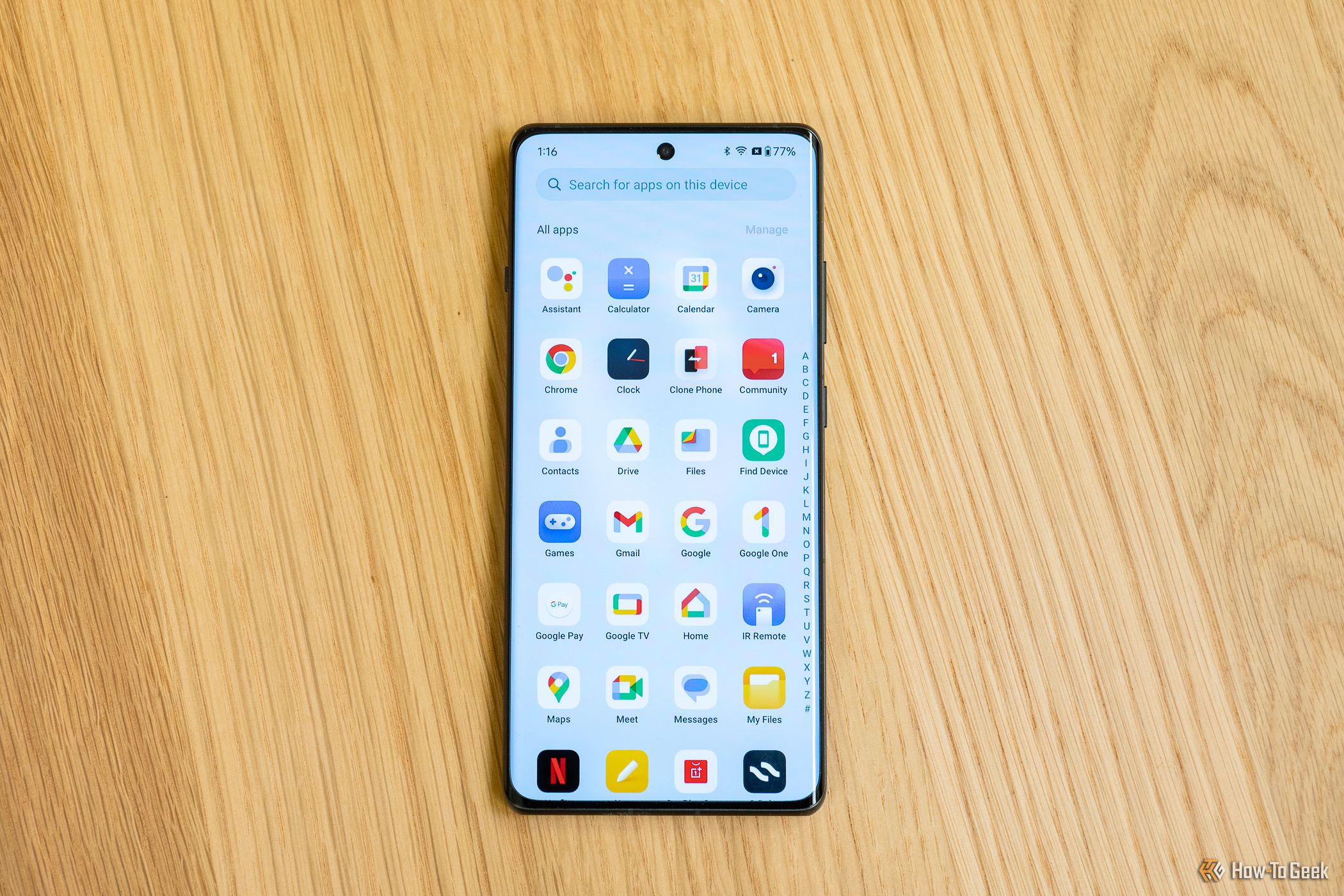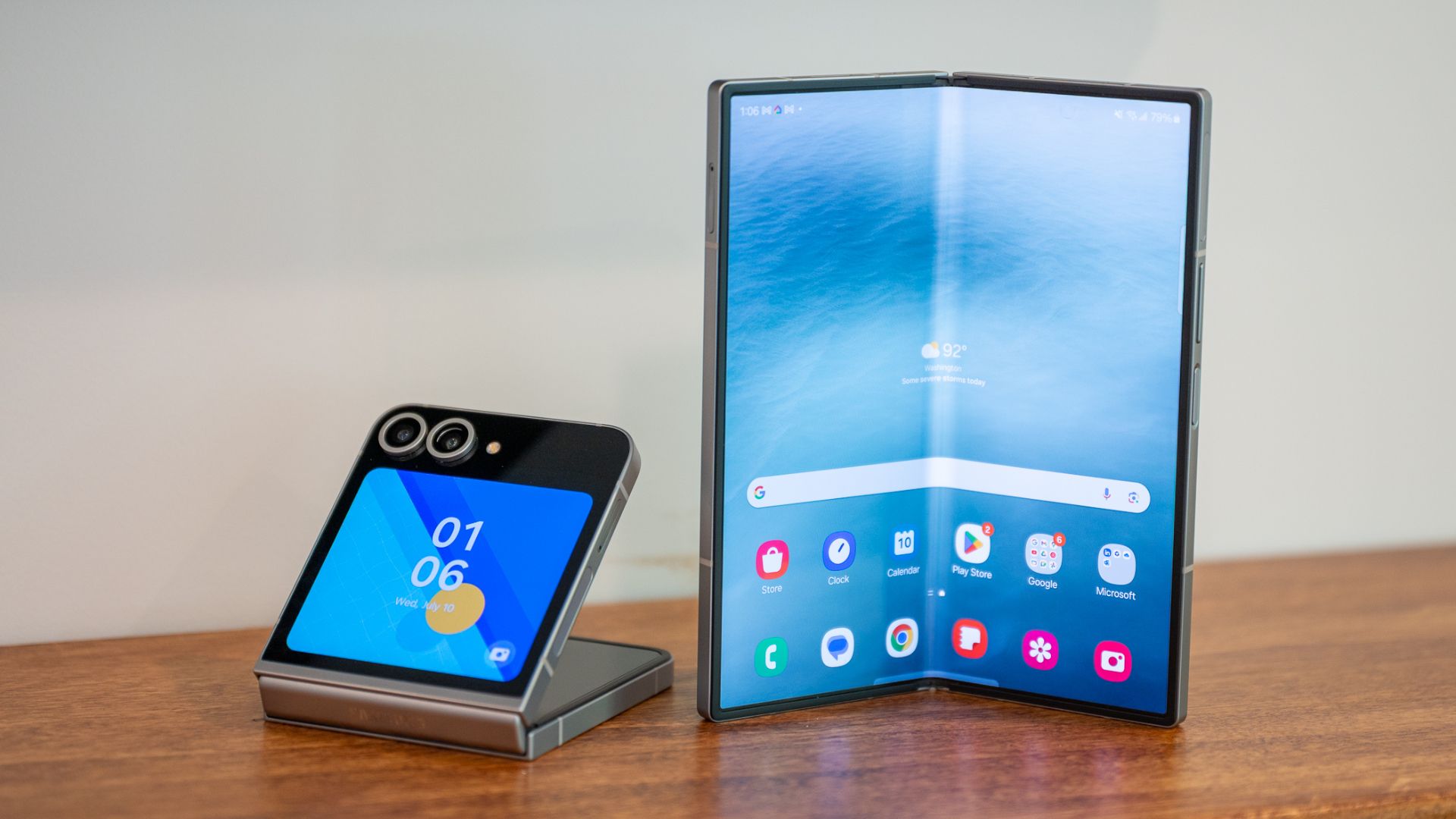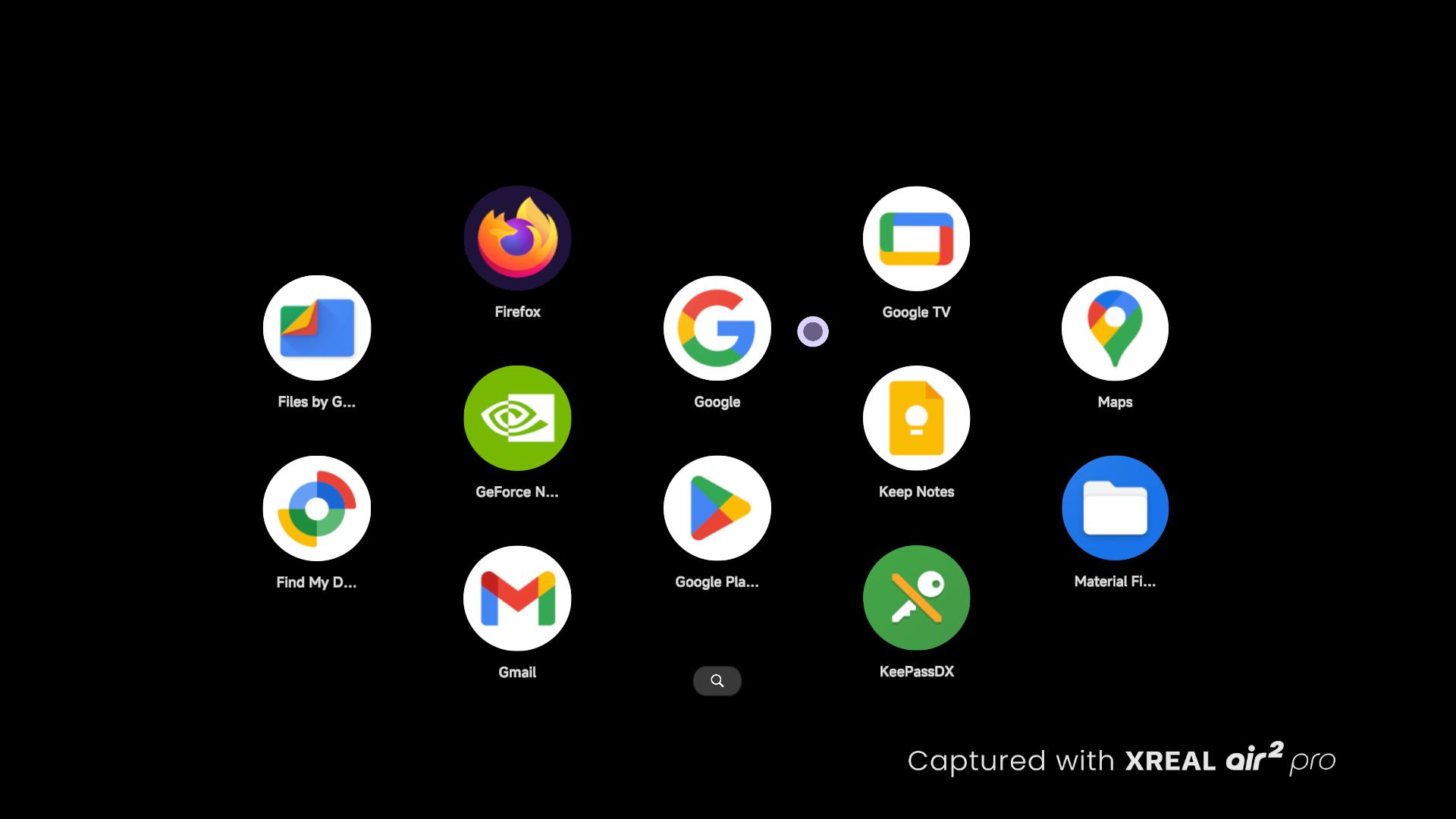Google Is Now the Biggest Maker of Android Bloatware
Back in the day, I used to loathe the custom skins and apps that Android phone makers added to their phones. Android's vendor-neutral default apps have since been replaced by Google apps, and the tech giant has used its dominance to fill our Android devices with far more pre-installed software than any other company.
Google and Android Are Not One and the Same
Google is Android's primary developer, but the operating system is open source. Countless other companies are invested in the platform.
There are big-name smartphone makers like Samsung, Motorola, and OnePlus. Tablets and eReaders from Amazon and BOOX. Niche products that you may not realize run Android, like the minimalist Light Phone and the Rabbit R1. There are self-checkout machines in big box stores that are merely Android tablets anchored in place. You may sign in at your dentist's office with an Android device without being aware of it. They're everywhere.
The promise of Android is that it's a mobile-first operating system that anyone can use to create great things without starting from scratch. This is how Android got buy-in from businesses and volunteers from all over the world. You can use and develop Android without being entirely beholden to the whims of another corporation.
After Android Became Popular, Google Wanted More Control

While Android is free, Google has control over the primary way developers distribute their apps to Android users. In order for a company to ship the Play Store on their device, they must agree to include a bundle of Google apps and background services. The company has also been willing to pay big bucks to limit the creation of alternative Android app stores. In 2023, Google lost a case against Epic for monopolistic practices centered around the Play Store, as reported by the BBC.
Google's apps are not neutral pieces of software providing needed functionality. They're Google services like Google Search, Chrome, Gmail, Google Calendar, Google Home, Google Docs, and YouTube. Are these programs that many (if not most) Android users would go out of their way to install? Sure, absolutely. But most of them are not essential parts of a phone or tablet. They're efforts to draw you into the Google ecosystem.
Google's insistence on making Android phone makers ship their apps is why a company like Samsung ships duplicate programs on their phones. They either give Google full control over the software experience, or they settle for confusing duplication. Samsung at least tries to clean up the clutter a bit by dumping most of the search giants' apps into a folder labeled "Google" on the home screen.

Many other companies have stopped making their own software and decided to stick to Google's defaults instead. There are plenty of users and product reviewers calling for just that. They're already deep in the Google ecosystem and just want the most optimized experience. Yet this stance ultimately limits the amount of choice available in the market. What's left for those of us who like Android phones but, after seeing all the shenanigans Google has gotten up to, want to opt out of doing business with them?
I Don't Want to Give All of My Data to Google
I made efforts to de-Google my life years ago, deleting my Google account entirely. I re-created one years later when an organization I'm involved with wanted to use Google Calendar to manage our schedule. I started to use this same account to log into Google Play for apps, but that's about it.
That means whenever I activate a new Android device, I go through the onboarding process and un-check as many boxes as I can. Then, I spend time uninstalling all the apps I don't want. Whether I'm setting up a Pixel or a Galaxy Z Fold, the bulk of the apps I'm removing come from Google. I don't want YouTube Music preinstalled any more than I want to see Facebook or TikTok. I don't use Chrome as my browser on any device, nor do I use Google Search.
It's not that I don't use any Google apps. I find Google Maps useful, especially due to how much information it provides about local businesses. I watch YouTube, since it is the primary way major and independent publishers alike distribute video. But these apps don't provide essential phone functionality in the way that a gallery app and a local video player do. They're the kind of programs many people would immediately seek out on their own in the Play Store. Still, they're preinstalled to drive more people toward Google services and provide the company with more marketable data.
People are quick to call out budget Motorola phones for installing unwanted shopping apps and random games, but Google's software collects far more data and is much more intrusive. We're just conditioned to expect them, even if we have never once clicked on Google Home.
Some Preinstalled Apps Are Better Than Google's
Even if I liked the Google ecosystem and actively took part in it, I would still be sad to see Android phone makers give up on making their own software. Some companies do a better job at creating certain apps than Google does.
Samsung Internet is an excellent browser. It's fully capable of replacing a desktop browser, and it has features that Google won't include because it competes with the company's business model, such as privacy features that block trackers. Samsung Gallery is one of the best apps for managing photos saved on your device. Samsung Notes is a far more comprehensive note-taking app than Google Keep. Samsung My Files feels more like a desktop file manager than Files By Google.

Phone makers don't have to sacrifice the beauty of stock Android to give us custom software. The few apps Motorola does still provide integrate perfectly with Android's look and feel. The company includes software for customizing your phone more extensively, adds more gestures, and provides support for connecting your phone to a monitor or a TV (or a lapdock), using it as either a PC, video game console, or set-top box.

Nothing (the company) shows how much style a phone maker can give their phones without making their devices as garish and inconsistent as the Android skins of years past. Android would be far less interesting without their innovations and experimentation.
Google Apps Make Android Phones All Feel the Same
As Google's control over software has grown, there is increasingly less difference between one Android device and the next. You walk through similar set-up screens, are presented with the same data collection options, and see your app drawer pre-populated with largely the same software.
The diversity of options is a big part of what draws many of us toward Android phones over the iPhone. Yet physical differences now come down to the style of camera bump and branding. Some people used to buy LG phones because they loved the company's software. That company no longer makes phones. HTC Sense was a vibe. The company is still technically around, but its presence and its software are a shadow of its former self. Google software has filled the void.
Phones aren't the only devices that suffer from this. Consider the XREAL Beam Pro, an Android-based (and far more affordable) alternative to Apple's Vision Pro. It's a tempting addition to the AR glasses I replaced my computer monitor with. When you launch the device for the first time, you're presented with a large array of Google apps that you probably didn't buy AR glasses to use. They continue to clutter up the launcher unless you dive into settings and disable them.

XREAL isn't a Google company, but since access to the Play Store is a big part of the device's appeal, they're required to shill Google services, at a detriment to the user experience.
I love Android and appreciate the work that (primarily) Google developers put into it. The platform as a whole is far more polished, attractive, and feature-complete than it was back in the day of more diverse Android phones. Part of the experimentation back in the day came out of a need to fill the gaps in stock Android's functionality, after all.
Sadly, the amount of Google bloatware worsens the experience. If I want a Google device, I can buy a Pixel. For all other phones, let phone makers and their customers decide what kind of apps we want to see shipped on our phones.
The above is the detailed content of Google Is Now the Biggest Maker of Android Bloatware. For more information, please follow other related articles on the PHP Chinese website!

Hot AI Tools

Undresser.AI Undress
AI-powered app for creating realistic nude photos

AI Clothes Remover
Online AI tool for removing clothes from photos.

Undress AI Tool
Undress images for free

Clothoff.io
AI clothes remover

Video Face Swap
Swap faces in any video effortlessly with our completely free AI face swap tool!

Hot Article

Hot Tools

Notepad++7.3.1
Easy-to-use and free code editor

SublimeText3 Chinese version
Chinese version, very easy to use

Zend Studio 13.0.1
Powerful PHP integrated development environment

Dreamweaver CS6
Visual web development tools

SublimeText3 Mac version
God-level code editing software (SublimeText3)

Hot Topics
 1672
1672
 14
14
 1428
1428
 52
52
 1332
1332
 25
25
 1276
1276
 29
29
 1256
1256
 24
24
 Pixel 9a vs. Samsung Galaxy A56: Which Is the Better Deal?
Apr 15, 2025 am 03:02 AM
Pixel 9a vs. Samsung Galaxy A56: Which Is the Better Deal?
Apr 15, 2025 am 03:02 AM
Google Pixel 9a vs. Samsung Galaxy A56: A Detailed Comparison Google's Pixel 9a and Samsung's Galaxy A56 are strong contenders in the mid-range smartphone market, both boasting impressive features at a $499 starting price. However, the ideal choice
 6 Best Gemini Features to Try on Your Google Pixel 9
Apr 15, 2025 am 01:09 AM
6 Best Gemini Features to Try on Your Google Pixel 9
Apr 15, 2025 am 01:09 AM
Unlock the Power of AI on Your Google Pixel 9: A Guide to Essential Features Google Pixel 9 users enjoy a suite of powerful AI-driven features. This guide highlights several, from photo enhancements to real-time translation. Let's explore what your
 You Don't Have to Choose Between iPhone and Android With the New Chipolo Pop Tracker
Apr 17, 2025 am 03:01 AM
You Don't Have to Choose Between iPhone and Android With the New Chipolo Pop Tracker
Apr 17, 2025 am 03:01 AM
Chipolo Pop Bluetooth Tracker Review: Taking into account both Apple and Android Losing your keys or wallet is a headache. Chipolo has been committed to helping users find lost items, and their latest product Pop is designed to meet the needs of both iPhone and Android users. It combines some of the best features of previous trackers to become a multi-functional device. If you have used Chipolo’s tracker before, you will notice that Pop has a similar colorful look as the previous Chipolo tracker. The key difference, however, is that it can work with both Apple's Find My Devices networks and Google's Find My Devices networks. Previously, you had to make a choice: iPhone users use Chi
 The Pixel 10 Camera Leak Has Me Excited (And Slightly Concerned)
Apr 15, 2025 am 12:56 AM
The Pixel 10 Camera Leak Has Me Excited (And Slightly Concerned)
Apr 15, 2025 am 12:56 AM
Pixel 10 Leaks: A Telephoto Lens, But at What Cost? The anticipation surrounding Pixel leaks is always exciting, especially given Google's knack for delivering impressive smartphone experiences—clean Android, seamless AI integration, and surprisingly
 Plex Updates, the Pixel 9a, and a Whole Lot of Tariffs: Weekly Roundup
Apr 15, 2025 am 12:54 AM
Plex Updates, the Pixel 9a, and a Whole Lot of Tariffs: Weekly Roundup
Apr 15, 2025 am 12:54 AM
This week's tech headlines are packed with exciting news! From new phone releases and app updates to price hikes and software support changes, there's plenty to unpack. Here's a summary of the biggest stories you might have missed: Major Announcement
 Android 15 Says Goodbye to 16GB Phones
Apr 17, 2025 am 12:54 AM
Android 15 Says Goodbye to 16GB Phones
Apr 17, 2025 am 12:54 AM
Android devices with Google Play Store must now have at least 32GB of internal storage. This move aims to curb the issue of budget devices quickly running out of space. The updated Google Mobile Services (GMS) agreement mandates a minimum of 32GB int
 Samsung Delays Its Big Android 15 Update Due to Bug
Apr 16, 2025 am 01:06 AM
Samsung Delays Its Big Android 15 Update Due to Bug
Apr 16, 2025 am 01:06 AM
Samsung urgently stopped Android 15 (One UI 7) update: Major bugs cause phones to be unlocked After months of waiting, multiple delays and six rounds of testing, Samsung finally released the highly anticipated Android 15 (One UI 7) update early last week. Unfortunately, however, Samsung had to urgently stop the global update due to a serious bug. On April 7, Samsung began to push One UI 7 updates for Galaxy S24 series, Z Fold 6 and other models in South Korea, and expanded to other regions such as the United States on April 10. But over the weekend, the company found multiple issues, including a major bug, and reportedly had been reported to have been from global servers
 Get the Samsung Galaxy S24 FE for $150 Off Today
Apr 17, 2025 am 12:55 AM
Get the Samsung Galaxy S24 FE for $150 Off Today
Apr 17, 2025 am 12:55 AM
Samsung Galaxy S24 FE: A great flagship phone with limited time special offer! Original price $650, current price $500, save $150! The Samsung Galaxy S24 FE (Fan Version) is a more affordable choice for Samsung flagship phones. While there are some reductions in screen resolution and processor (with the Exynos 2400e chipset), it retains the flagship-class rear main camera. Amazon and Samsung's official websites are both priced at $500. That's $150 less than the original price, and it's absolutely great value for money for this phone with great hardware and long-term software support. The Galaxy S24 FE is an economical alternative to the Galaxy S24 and S25 series, and it comes with 6.7




